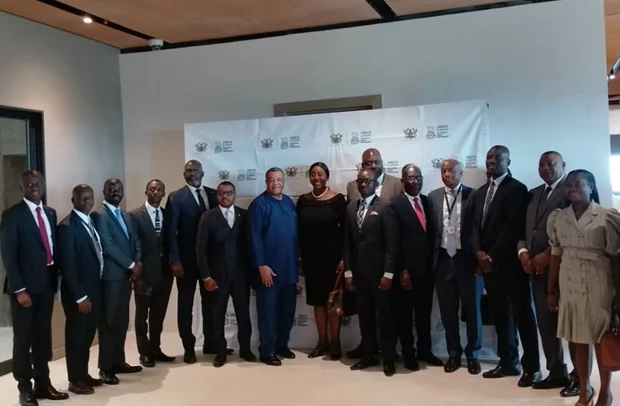Mr. Goosie Tannoh (M) with some participants
Presidential Advisor on the 24-Hour Economy, Goosie Tannoh, has urged banks to collaborate with the government to help provide tailored financing for businesses to help drive the successful implementation of the programme.
Speaking at a Banking Sector Roundtable held at Bank Square in Accra, under the theme, “Financing Ghana’s 24-Hour Future: The Role of Banks in the Transformational Journey,” Mr. Tannoh highlighted that while the Secretariat of the 24-Hour Economy has made considerable progress engaging stakeholders, challenges in accessing credit remain a major challenge, particularly for Small Medium Enterprises (SMEs).
He said, “We’ve worked with several banks and financial institutions to develop solutions that support the SME sector but the cost of funding and the collateral demands in Ghana’s banking sector continue to be a serious challenge.”
According to him, many SMEs especially startups and young entrepreneurs struggle to meet traditional collateral requirements, which often demand physical assets.
That form of model, he indicated, is unsustainable and continues to stifle innovation and private sector growth hence his outfit is actively exploring and incorporating alternative forms of collateral as part of the ecosystem.
“Let’s be honest: how many small business owners in Ghana have a house they can offer as collateral. Our goal is to create an environment where access to credit is possible without unrealistic collateral obligations. Finance is at the centre of development, without it, all our programmes and ideas remain shelf documents. We must bring banks into the heart of this agenda,” he stated.
He also explained that unlocking the potential of Ghana’s productive sectors especially in agriculture, manufacturing, logistics, and digital services requires a coordinated approach between public and private institutions, with banks playing a central role while lauding the efforts of banks to support government to implement the 24-Hour economy.
He reiterated that the policy is a private-sector-led initiative designed to stimulate job creation, industrial growth, targeting critical value chains that seeks to increase productivity and economic output.
Director of Banking Supervision Ismail Adam, in a speech delivered on behalf of the Governor of the Bank of Ghana, Dr. Johnson Asiama, reiterated the central bank’s commitment to supporting the 24-Hour Economy by creating the macroeconomic conditions necessary for stable and inclusive financial growth.
He emphasised that the success of the 24-Hour Economy depends not only on access to finance but also on the stability and resilience of the banking sector while ensuring public confidence in the system through regular supervision and enforcement of prudential regulations.
“The Bank of Ghana stands ready to support this initiative using its core monetary policy tools,” Adam stated. “With stable prices and lower inflation, interest rates can be adjusted downward, allowing financial institutions to provide more affordable credit.”
“We continuously monitor and supervise regulated financial institutions to ensure they remain sound, comply with international best practices, and uphold strong corporate governance and risk management systems,” he noted.
He also stated that innovation in payment systems and financial technologies (fintech’s) would play a key role in supporting 24-hour operations, making banking and financial services more accessible to businesses operating beyond traditional working hours.
The roundtable meeting brought together Association of Banks, Heads of financial Institutions, non-bank financial institutions including the Ghana Infrastructure Investment Fund (GIIF), Ghana Exim Bank, and officials of Ghana Incentive-Based Risk-Sharing System for Agricultural Lending (GIRSAL).
Participants at the meeting also discussed the need for a national financing strategy aligned with the 24-Hour Economy, where banks, development finance institutions, and regulators work together to support SMEs across various value chains from agribusiness, agro-processing to manufacturing, logistics, and digital commerce.
The Secretariat further assured the public that it will continue to engage with all stakeholders to ensure that programmes under the 24 Hour Economy translates into economic growth, jobs, and opportunities for Ghanaians.
By Ebenezer K. Amponsah


